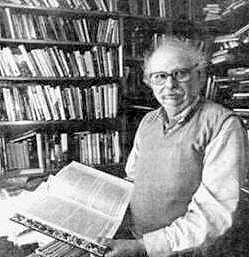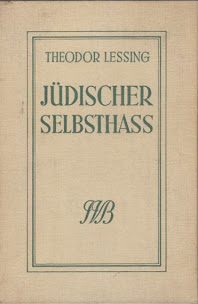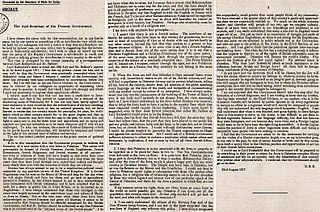 | |
| Author | Ruth Wisse |
|---|---|
| Publisher | Free Press |
Publication date | 1992 |
| Pages | 225 |
| ISBN | 978-0743229616 |
If I Am Not For Myself: The Liberal Betrayal of the Jews is a 1992 book by Ruth Wisse.
 | |
| Author | Ruth Wisse |
|---|---|
| Publisher | Free Press |
Publication date | 1992 |
| Pages | 225 |
| ISBN | 978-0743229616 |
If I Am Not For Myself: The Liberal Betrayal of the Jews is a 1992 book by Ruth Wisse.
Literary scholar Edward Alexander describes Wisse's book as an effort to explain how Arabs, having refused to accept a partition of Mandatory Palestine or creation of a Jewish state and launched a long war of terrorist attacks interspersed with full-scale invasions and boycotts, now accuse Israel being the aggressor, a process of inversion in which Zionism, the Jewish aspiration for a homeland, was, in Wisse's words, "declared racist because it deprived Palestinian Arabs of their homeland." [1]
In If I Am Not For Myself Wisse, who describes liberalism as belief in progress, rationality, freedom, cultural pluralism and the rule of law, explores the reasons why liberalism failed to save the Jews of Europe from the Holocaust. "Liberals," she argues, "trust that all human problems are amenable to negotiated solutions, that all people are united in a spirit of brotherhood... They detest the use of force, not only for the damage it causes but because in admitting the limits of reason it throws humankind back to a more primitive stage of civilization. The pure liberal spirit precludes the possibility of intractable hatred or intransigent political will." Liberalism, she argues, could not protect Jews from Nazi Germany. Liberals according to Wisse, were unsympathetic to Jews, "not because of any personal antipathy but because the national fate of the Jews contradicted their view of the world and called into question their deepest assumptions." [2]
Bringing her argument into the post-war period, Wisse argues that anti-Israel Arabs began to persuade Western liberals of the justice in opposing and seeking to destroy the Jewish state when they "exchanged the language of the right for the language of the left, presenting Israel as the bloodthirsty exploiter of impoverished innocent Arab masses... Since democratic society does not want to perceive itself as heartless or collaborationist, those who court favor with the Arabs have to deny the (Palestinian Arab) war against the Jewish state or else justify their betrayal of the Jews in a language of moral convenience. The tilt toward the Arabs has the code name of evenhandedness." [2]
According to Larry Zolf, in his 1992 book In Search Of Anti-Semitism, William F. Buckley Jr. coyly suggests "Let us concede that some critics of Israel are, in fact, anti-Semites," but Wisse is blunt, stating that, "Given the asymmetry between the hunter and his prey, it is easier (for liberals) to resent the Jews than to oppose the anti-Semites," and "Liberalism may have been the kindly offspring of Christianity in Europe but anti-Semitism was its nastier stepchild." [3]
In Zolf's estimate, although Wisse's book includes "the steamiest epilogue to an intellectual essay ever written by human hand. Suddenly, the reader finds himself or herself admitted to Wisse's adulterous affair with an adulterous Canadian turned Israeli, an affair carried out on the way to the top and right on the top –of Mt. Sinai," it is "often prolix and always humorless." [3]
Edward Alexander calls If I Am Not For Myself "one of the most important Jewish books of the past 50 years." [4]
Antisemitism or Jew-hatred is hostility to, prejudice towards, or discrimination against, Jews. This sentiment is a form of racism, and a person who harbours it is called an antisemite. Primarily, antisemitic tendencies may be motivated by negative sentiment towards Jews as a people or by negative sentiment towards Jews with regard to Judaism. In the former case, usually presented as racial antisemitism, a person's hostility is driven by the belief that Jews constitute a distinct race with inherent traits or characteristics that are repulsive or inferior to the preferred traits or characteristics within that person's society. In the latter case, known as religious antisemitism, a person's hostility is driven by their religion's perception of Jews and Judaism, typically encompassing doctrines of supersession that expect or demand Jews to turn away from Judaism and submit to the religion presenting itself as Judaism's successor faith—this is a common theme within the other Abrahamic religions. The development of racial and religious antisemitism has historically been encouraged by the concept of anti-Judaism, which is distinct from antisemitism itself.
Antisemitism has increased greatly in the Arab world since the beginning of the 20th century, for several reasons: the dissolution and breakdown of the Ottoman Empire and traditional Islamic society; European influence, brought about by Western imperialism and Arab Christians; Nazi propaganda and relations between Nazi Germany and the Arab world; resentment over Jewish nationalism; the rise of Arab nationalism; and the widespread proliferation of anti-Jewish and anti-Zionist conspiracy theories.

Zionism is an ethnocultural nationalist movement that emerged in Europe in the late 19th century and aimed for the establishment of a homeland for the Jewish people through the colonization of Palestine, an area roughly corresponding to the Land of Israel in Judaism, and of central importance in Jewish history. Zionists wanted to create a Jewish state in Palestine with as much land, as many Jews, and as few Palestinian Arabs as possible. Following the establishment of the State of Israel in 1948, Zionism became Israel's national or state ideology.

Semitic people or Semites is a term for an ethnic, cultural or racial group associated with people of the Middle East, including Arabs, Jews, Akkadians, and Phoenicians. The terminology is now largely unused outside the grouping "Semitic languages" in linguistics. First used in the 1770s by members of the Göttingen school of history, this biblical terminology for race was derived from Shem, one of the three sons of Noah in the Book of Genesis, together with the parallel terms Hamites and Japhetites.

Israel Shahak was an Israeli professor of organic chemistry at the Hebrew University of Jerusalem, a Holocaust survivor, an intellectual of liberal political bent, and a civil-rights advocate and activist on behalf of both Jews and Gentiles (non-Jews). For twenty years, he headed the Israeli League for Human and Civil Rights (1970–90) and was a public critic of the policies of the governments of Israel. As a public intellectual, Shahak's works about Judaism proved controversial, especially the book Jewish History, Jewish Religion: The Weight of Three Thousand Years (1994).
New antisemitism is the concept that a new form of antisemitism developed in the late 20th and early 21st centuries, typically manifesting itself as anti-Zionism. The concept is included in some definitions of antisemitism, such as the working definition of antisemitism and the 3D test of antisemitism. The concept dates to the early 1970s.

Tikkun was a quarterly progressive Jewish and interfaith magazine and website published in the United States that analyzed American and Israeli culture, politics, religion, and history in the English language. The magazine consistently published the work of Israeli and Palestinian left-wing intellectuals, but also included book and music reviews, personal essays, and poetry.

The terms "self-hating Jew", "self-loathing Jew", and "auto-antisemite" are pejorative terms used to describe Jewish people whose viewpoints, especially favoring Jewish assimilation, Jewish secularism, limousine liberalism, or anti-Judaism are perceived as reflecting self-hatred.

Joseph Andoni Massad is a Jordanian academic specializing in Middle Eastern studies, who serves as Professor of Modern Arab Politics and Intellectual History in the Department of Middle Eastern, South Asian, and African Studies at Columbia University. His academic work has focused on Palestinian, Jordanian, and Israeli nationalism.
The Jewish lobby are individuals and groups predominantly in the Jewish diaspora that advocate for the interests of Jews and Jewish values. The lobby references the involvement and influence of Jews in politics and the political process, and includes organized groups such as the American Jewish Committee, the American Israel Public Affairs Committee, B'nai B'rith, and the Anti-Defamation League.

Hedy Epstein was a German-born Jewish-American political activist and Holocaust survivor known for her support of the Palestinian cause through the International Solidarity Movement.

Ruth Wisse is a Canadian academic and is the Martin Peretz Professor of Yiddish Literature and Professor of Comparative Literature at Harvard University emerita. She is a scholar of Yiddish literature and of Jewish history and culture.

Anti-Zionism is opposition to Zionism. Although anti-Zionism is a heterogeneous phenomenon, all its proponents agree that the creation of the modern State of Israel, and the movement to create a sovereign Jewish state in the region of Palestine—a region partly coinciding with the biblical Land of Israel—was flawed or unjust in some way.
Antony Lerman is a British writer who specialises in the study of antisemitism, the Israeli–Palestinian conflict, multiculturalism, and the place of religion in society. From 2006 to early 2009, he was Director of the Institute for Jewish Policy Research, a think tank on issues affecting Jewish communities in Europe. From December 1999 to 2006, he was Chief Executive of the Hanadiv Charitable Foundation, renamed the Rothschild Foundation Europe in 2007. He is a founding member of the Jewish Forum for Justice and Human Rights, and a former editor of Patterns of Prejudice, a quarterly academic journal focusing on the sociology of race and ethnicity.

Criticism of Israel is a subject of journalistic and scholarly commentary and research within the scope of international relations theory, expressed in terms of political science. Israel has faced international criticism since its establishment in 1948 relating to a variety of issues, many of which are centered around human rights violations in its occupation of the West Bank and the Gaza Strip.
This timeline of anti-Zionism chronicles the history of anti-Zionism, including events in the history of anti-Zionist thought.

" 'Progressive' Jewish Thought and the New Anti-Semitism" is a 2006 essay written by Alvin Hirsch Rosenfeld, director of Indiana University's Center for the Study of Contemporary Antisemitism and professor of English and Jewish Studies. It was published by the American Jewish Committee (AJC) with an introduction by AJC executive director David A. Harris. The essay claims that a "number of Jews, through their speaking and writing, are feeding a rise in virulent antisemitism by questioning whether Israel should even exist".
Palestinianism is a term occasionally used to denote either the national political movement or Identity of the Palestinian people. It gained currency by its use in the works of Edward Said to describe a certain vein of theology opposed to Christian Zionism and that challenges Zionism and the right of Israel to exist.
Zionist antisemitism or antisemitic Zionism refers to a phenomenon in which antisemites express support for Zionism and the State of Israel. In some cases, this support may be promoted for explicitly antisemitic reasons. Historically, this type of antisemitism has been most notable among Christian Zionists, who may perpetrate religious antisemitism while being outspoken in their support for Jewish sovereignty in Israel due to their interpretation of Christian eschatology. Similarly, people who identify with the political far-right, particularly in Europe and the United States, may support the Zionist movement because they seek to expel Jews from their country and see Zionism as the least complicated method of achieving this goal and satisfying their racial antisemitism.
The exploitation of accusations of antisemitism, especially to counter anti-Zionism and criticism of Israel, may be described as weaponization of antisemitism, instrumentalization of antisemitism, or playing the antisemitism card. Bad-faith accusations against Israel's critics have been called a form of smear tactics. Some writers have compared them to playing the race card.